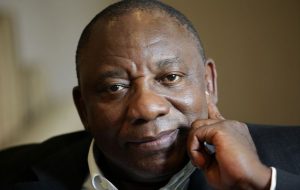

President Cyril Ramaphosa has announced that the whole of South Africa will move to level 3 lockdown from 1 June.

Cyril Ramaphosa, President of South Africa
In a media briefing on Sunday evening (24 May), Ramaphosa said that this will include the reopening of all districts as well as key areas of the economy.
He added that the government will take a ‘differentiated approach’ to hotspots which have cases of more than five active cases per 100,000 members of the population.
Ramaphosa said that he is particularly concerned about the City of Cape Town which now accounts for half of all the country’s cases.
Other hotspots include:
Ramaphosa said that these hotspots will be reviewed every two weeks. He added that any part of the country could be moved back to levels 4 or 5 where a spread of infections is seen.
He said that districts which have fewer cases could move down to levels 2 or 3.
The president said that there are now 22,583 confirmed cases of coronavirus in the country – an increase of 1,240 cases from the 21,343 cases reported on Saturday.
He said that the total number of deaths has now reached 429 – an increase of 22 deaths from 407 reported before.
The president said that there are 11,000 active cases in the country – with 800 in hospital, and 128 in intensive care.
Smoking ban to continue
Ramaphosa said that all areas of the economy will be allowed to reopen from 1 June – with the exception of a few key areas.
The list of prohibited businesses include:
Other changes announced by Ramaphosa include:
Easing of restrictions
The announcement comes exactly 10 weeks after South Africa announced a state of national disaster around the coronavirus pandemic.
Ramaphosa apologised for harsh restrictions, but noted that the lockdown has bought South Africa time to prepare for an anticipated surge in infections.
“I am sorry that these measures imposed a great hardship on you – restricting your right to move freely, to work and eke out a livelihood.
“As a result of the measures we imposed – and the sacrifices you made – we have managed to slow the rate of infection and prevent our health facilities from being overwhelmed”
The president said that the government has used the time during lockdown to build up an extensive public health response and prepare our health system for the anticipated surge in infections.
He added that projected models show that the coronavirus in South Africa will get much worse before it gets better. He said that the models also show that cases will be highly dependent on actions taken by the public.
“Now it is time for most of us to return to work and to resume parts of our lives that have been on hold since the lockdown began.
“However, I want to emphasise that the easing of some restrictions does not mean that the threat posed by the coronavirus has passed or that our fight against the disease is over.
“In fact, the risk of a massive increase in infections is now greater than it has been since the start of the outbreak in our country,” the president said. – businesstech.co.za